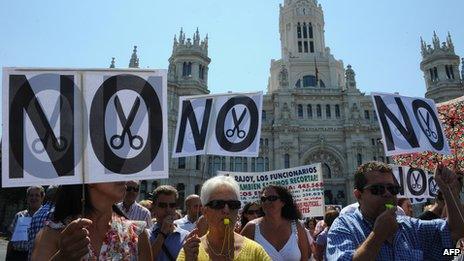Euro crisis: Spain debt fuels German angst
- Published
- comments

Madrid: Another day, another anti-austerity demonstration in Spain
Sometimes in a prolonged crisis there comes a moment when the fundamental questions become clearer.
The Spanish crisis is doing just that. Its borrowing costs of around 7.5% cannot be sustained. Some time, probably in the autumn, the country will need a full-blown bailout. It will not be immediately. The country has around 40bn euros (£31bn; $48bn) to survive the short term.
If and when a rescue comes it will focus attention on the eurozone's bailout fund. Currently the EFSF has around 250bn euros left in the pot. That will be replaced by a permanent fund, the ESM, probably in September. When it is fully launched it is hoped it will have access to 500bn euros. A Spanish bailout would need around 350bn. An Italian bailout might need more than 700bn euros. Most officials doubt there are the resources to save Italy and Spain together.
And that brings us to Germany. Throughout this crisis the pressure has been on Germany to do more to save the euro - to agree to common European bonds, to agree to a joint deposit guarantee scheme. All require Germany to increase its liabilities. Indeed, a common assumption is that German taxpayers must do more to help out weaker eurozone countries.
And then overnight the ratings agency Moody's raises a disturbing question. It downgrades the outlook for Germany (and the Netherlands and Luxembourg) from stable to negative. One of the reasons was the extra financial burden that might be involved in supporting Italy and Spain. It was a warning that even a stellar economy like Germany cannot carry the weight of the eurozone's debts.
The German government was irritated by the assessment and affirmed the strength of the German economy. But ultimately the risks to Germany in becoming the eurozone's paymaster cannot be disguised.
Moody's did cite a second reason for its outlook for Germany - the risk that Greece might leave the eurozone.
The international lenders - the EU, IMF and European Central Bank - are back in Athens assessing whether Greece has done enough to meet its bailout conditions and to qualify for a further tranche of funding in September. It will only get the next 31bn euros if it gets a favourable report. But that is in doubt. Tax revenues are missing their targets, as is the privatisation programme and Greece is behind in reducing staffing numbers in public services.
Some German politicians are expressing doubts that Greece can stay in the eurozone. So we will be back with a very familiar dilemma. There is an argument for forcing Greece out if it is judged to have failed to deliver. But expect the combined weight of European officials to stress the risks and dangers of such an option. And in the end fear will probably persuade Chancellor Angela Merkel to stick with Greece - but Italy and Spain may raise a much more difficult dilemma.